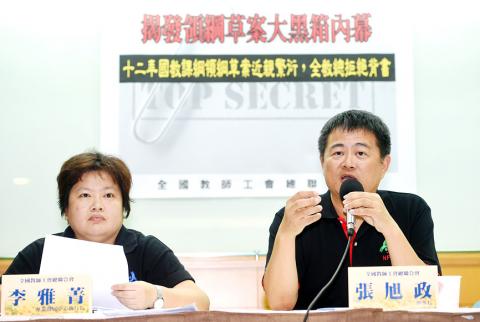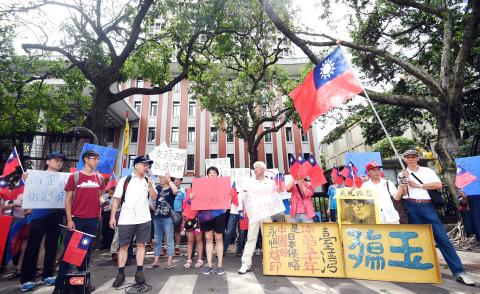The approval process for a new 12-year education plan continues to use the same opaque procedures behind earlier controversial adjustments to high-school curriculum guidelines, a teachers’ union alleged yesterday, calling for the process to be “rebooted.”
“The ‘fine-tuning’ of history curriculum guidelines was already unacceptable, but we care even more about the process under which new guidelines for all subjects are to be produced,” National Federation of Teachers’ Unions president Chang Hsu-cheng (張旭政) told a news conference in Taipei. “While in the past the Ministry of Education has tightly controlled the drafting of guidelines, we feel the process should be opened up to allow for a more diverse range of opinions to be represented.”
Chang said that all appointments to new guideline drafting committees were made by committee conveners directly appointed by Ko Hwa-wei (柯華葳), president of the National Academy for Educational Research, the agency that oversees the creation of curriculum guidelines, adding that a reliance on personal relationships had resulted in “like-minded” committee members making decisions that did not reflect the public’s point of view.

Photo: Lo Pei-der, Taipei Times
Following the so-called “minor adjustments” of social studies curriculum guidelines last year, the academy is currently in the process of drafting new guidelines as part of plans to implement a compulsory 12-year education plan. The ministry’s plan calls for sweeping changes to curriculum guidelines beginning in 2018, including a sharp reduction to the number of required classes to make room for a range of new electives.
Li Ya-jing (李雅菁), chief of the federation’s professional development center, said the academy rejected the vast majority of teachers nominated by the union, with none of their elementary-school and middle-school teacher nominees appointed.
While the academy invited the union to nominate representatives for “consultative forums,” membership was still subject to approval by the drafting committee conveners and any forum conclusions would merely be sent to the committees for “consideration” rather than having any kind of binding force, Li said.

Photo: Lo Pei-der, Taipei Times
She called for implementation of new guidelines to be delayed to allow for a “reboot” of the process, including a reshuffling of the drafting committees’ membership to allow for more substantial federation representation.
Guideline drafts proposed by the academy’s committees were rejected earlier this month by the ministry’s curriculum development team for unspecified reasons.
Chang, a member of the team, said he did not know why the guidelines were rejected as he was abroad at the time, adding that the power of the team was limited, because it could only veto guidelines rather than directly call for changes.
Chang said the federation would turn down all invitations sent by the academy requesting their members’ presence at public hearings on the curriculum guidelines, which are scheduled to take place next month and in October, because the academy’s actions are an attempt to mislead the public into believing that the guidelines were introduced after effective communication.
The academy rejected the allegation, saying four teachers recommended by the federation were on the curriculum guideline development and revision teams.
It also dismissed accusations that members of the development teams were chosen by an “old boys’ network,” saying the members were vetted from a pool of academics and experts twice as large as its current staff, in compliance with due legal process.
Regarding the alleged rigging of the guidelines approval process, the academy said the guidelines are the result of collaboration among more than 700 certified teachers who invested considerable amounts of time and energy to gather information, draft, debate and discuss their work, adding that counseling and review committees have been put into place, while online forums and public hearings have also been arranged.
On the allegation that it has not made public the roster of development team members, the academy said that was a “clear misunderstanding,” as the list, as well as session minutes, are readily available on its Web site.

CHAOS: Iranians took to the streets playing celebratory music after reports of Khamenei’s death on Saturday, while mourners also gathered in Tehran yesterday Iranian Supreme Leader Ayatollah Ali Khamenei was killed in a major attack on Iran launched by Israel and the US, throwing the future of the Islamic republic into doubt and raising the risk of regional instability. Iranian state television and the state-run IRNA news agency announced the 86-year-old’s death early yesterday. US President Donald Trump said it gave Iranians their “greatest chance” to “take back” their country. The announcements came after a joint US and Israeli aerial bombardment that targeted Iranian military and governmental sites. Trump said the “heavy and pinpoint bombing” would continue through the week or as long

TRUST: The KMT said it respected the US’ timing and considerations, and hoped it would continue to honor its commitments to helping Taiwan bolster its defenses and deterrence US President Donald Trump is delaying a multibillion-dollar arms sale to Taiwan to ensure his visit to Beijing is successful, a New York Times report said. The weapons sales package has stalled in the US Department of State, the report said, citing US officials it did not identify. The White House has told agencies not to push forward ahead of Trump’s meeting with Chinese President Xi Jinping (習近平), it said. The two last month held a phone call to discuss trade and geopolitical flashpoints ahead of the summit. Xi raised the Taiwan issue and urged the US to handle arms sales to

State-run CPC Corp, Taiwan (CPC, 台灣中油) yesterday said that it had confirmed on Saturday night with its liquefied natural gas (LNG) and crude oil suppliers that shipments are proceeding as scheduled and that domestic supplies remain unaffected. The CPC yesterday announced the gasoline and diesel prices will rise by NT$0.2 and NT$0.4 per liter, respectively, starting Monday, citing Middle East tensions and blizzards in the eastern United States. CPC also iterated it has been reducing the proportion of crude oil imports from the Middle East and diversifying its supply sources in the past few years in response to geopolitical risks, expanding

An Emirates flight from Dubai arrived at Taiwan Taoyuan International Airport yesterday afternoon, the first service of the airline since the US and Israel launched strikes against Iran on Saturday. Flight EK366 took off from the United Arab Emirates (UAE) at 3:51am yesterday and landed at 4:02pm before taxiing to the airport’s D6 gate at Terminal 2 at 4:08pm, data from the airport and FlightAware, a global flight tracking site, showed. Of the 501 passengers on the flight, 275 were Taiwanese, including 96 group tour travelers, the data showed. Tourism Administration Deputy Director-General Huang He-ting (黃荷婷) greeted Taiwanese passengers at the airport and